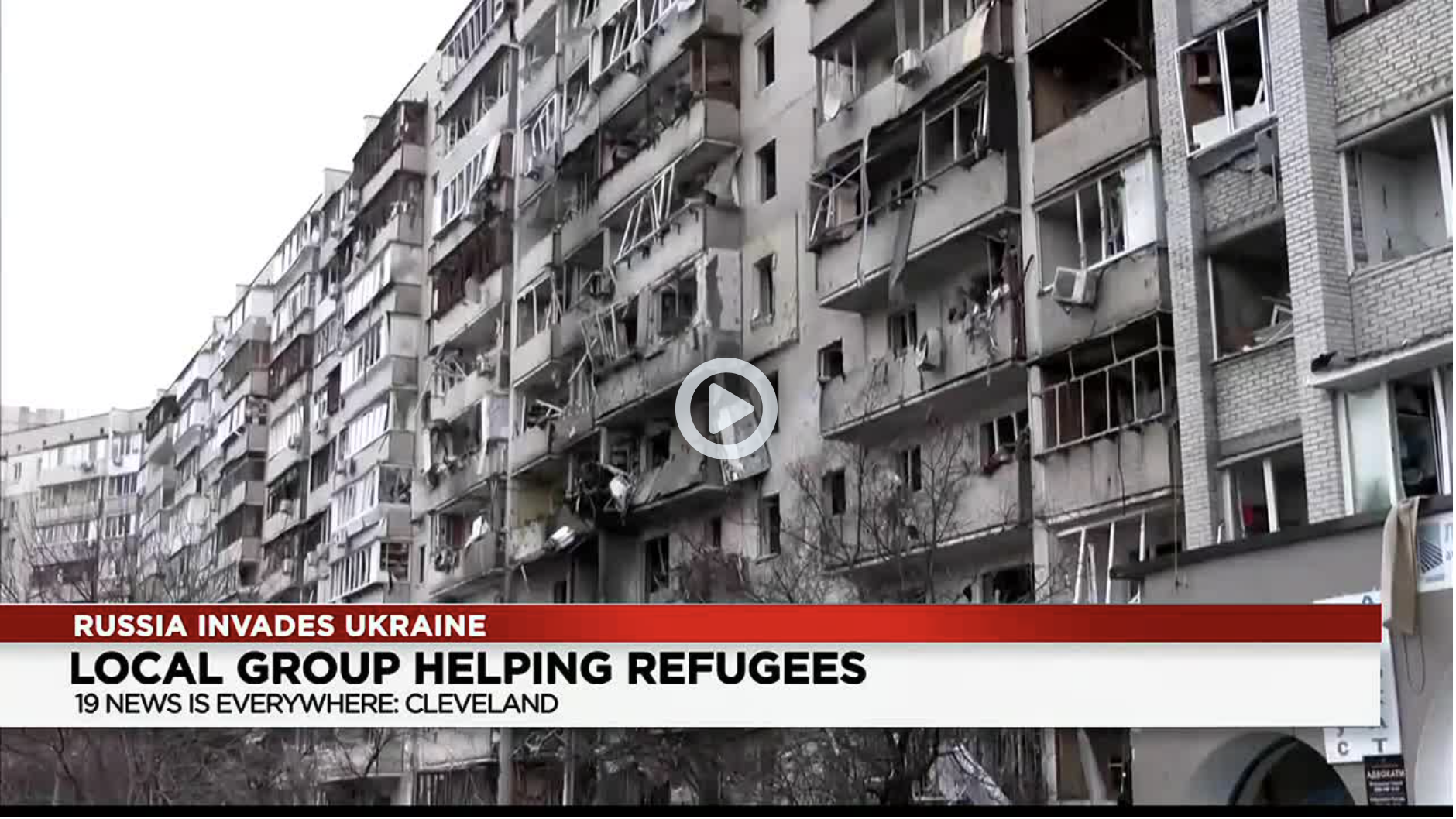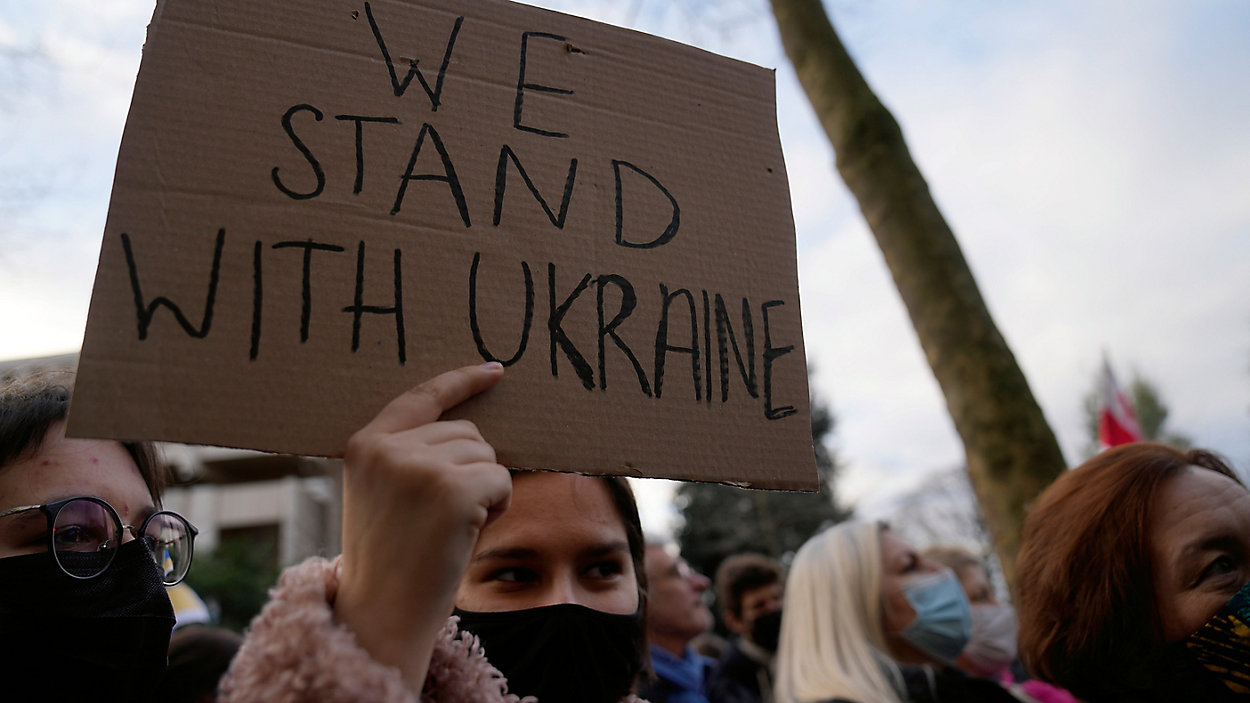Global Cleveland Is Pairing International Newcomers With Local Mentors
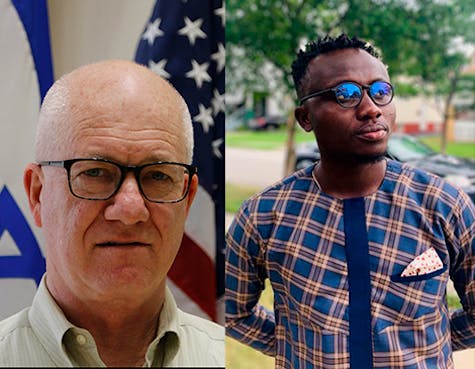
Kwame Botchway and Oren Baratz seem like an unlikely duo.
Botchway, a program manager at Cleveland Neighborhood Progress, moved from Ghana to Cleveland in 2017 to study at Case Western Reserve University. Baratz, senior vice president of external affairs of the Jewish Federation of Cleveland, has called the city home for 16 years.
But once a month, the two of them hop on Zoom and talk about normal mentor-mentee stuff: leadership, values, ideas.
Their monthly chats are thanks to a new Global Cleveland program. Global Rising pairs immigrants within the city with a mentor. Over nine months, each of the 24 participants receives guidance on leadership and professional development skills.
Botchway applied for the program in an effort to make more connections and be part of the city’s growth.
“I’m really excited about the city and the prospects that it has,” he says. “And I’m really excited to be part of building the city into what it ought to be.”
That sentiment is exactly why Global Cleveland President Joe Cimperman wanted to start the program earlier this year.
“To immigrate is an entrepreneurial act,” he says. “Just to come here takes a skill set that requires you to have a lot of savvy. But what so often happens in cities is networks are closed. Our goal is to make Cleveland, Ohio, the most welcoming place in North America in five years.”
After getting an application for the program, Global Cleveland spends hours matching participants and mentors to make sure each is a good fit. And it has been for Baratz and Botchway.
“It’s about me being there for Kwame, and Kwame being there for me,” Baratz says. “That’s what friendship is.”
Botchway plans to cook a Ghanian meal for Baratz and his family as soon as they can safely meet in person.
“No matter where I end up, Cleveland would always be my American hometown,” Botchway says. “I’ve made really good friends and meaningful relationships that make it feel like home.”
Newly naturalized Americans could play pivotal role in Ohio’s general election, new immigration report reveals
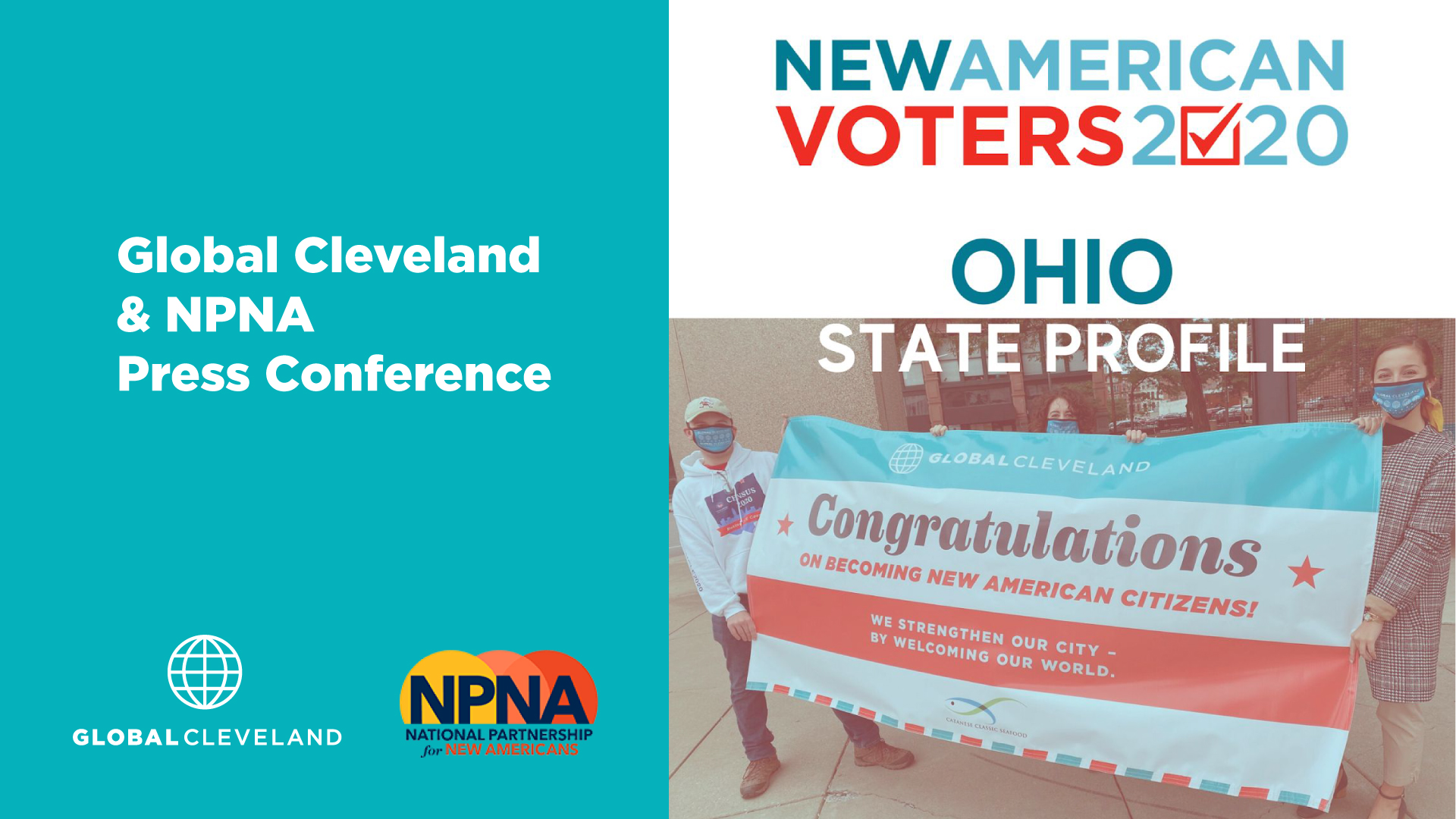
CLEVELAND, Ohio — With the 2020 presidential election less than a month away, a demographic of Ohio voters could emerge as a critical group in helping to decide the election.
Recently naturalized citizens, new Americans who naturalized since 2014, are a sizable group in Ohio. The National Partnership for New Americans released a national report in June called “The Power of Newly Naturalized Citizens in the 2020 Elections,” and Global Cleveland, The Refugee Response and AsiaTown Cleveland partnered to help announce NPNA’s Ohio data Thursday.
According to the report, Ohio had 54,818 people become naturalized from 2014-2018. That number is estimated to be over 62,000 through 2020. With the state having more than 267,000 naturalized citizens, just under a quarter of them are newly naturalized.
Diego Iniguez-Lopez, the policy and campaigns manager at NPNA, said some immigrant and refugee populations might be ignored or not engaged with enough by candidates since those populations don’t usually have high turnout.
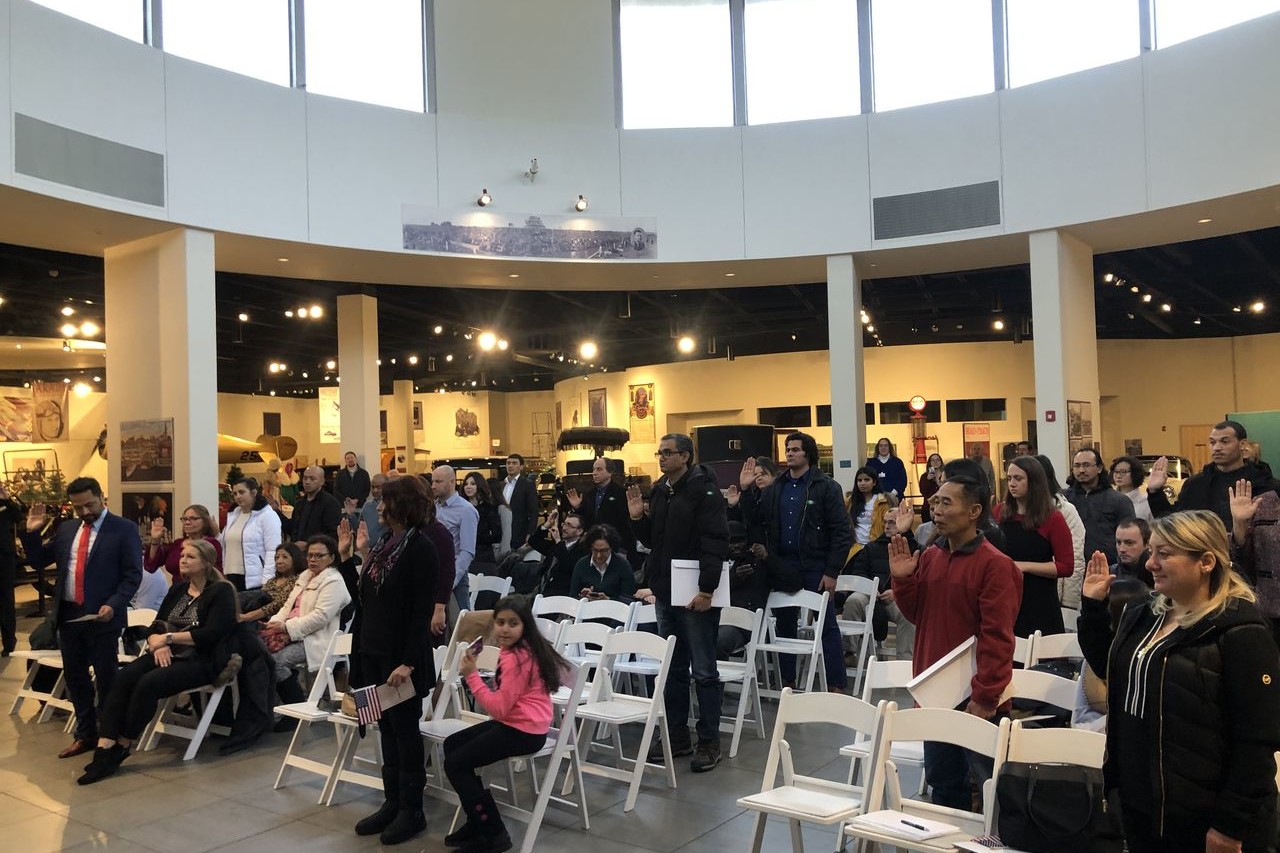
30 people take their Oath of Allegiance before becoming U.S. Citizens at Cleveland History Center.
But with this year’s election, one of the most important in recent memory, the urge to fulfill their civic duty is present among new Americans.
“We’re seeing a lot of grassroots organizations, we’re seeing community members themselves, we’re seeing through social media that people are not only bringing up the mail-in options and absentee ballots,” Iniguez-Lopez said. “But they’re doing that in creative, multi-linguistic ways because all communities are starting to understand why it’s so critical to vote, to go out or to send in their ballot this year.”
AsiaTown Cleveland, part of MidTown Cleveland, is an organization that has helped with voter registration and census registration. The organization does biweekly food distribution at different restaurants in AsiaTown, and during those distributions, the group provided voter registration and census registration.
On Monday, the last day to register to vote, an AsiaTown Cleveland staffer heard about an immigrant whose parents wanted to register to vote. AsiaTown helped the parents submit their registration to the Cuyahoga County Board of Elections before the deadline.
“It was amazing effort on behalf of these folks who were really excited to vote, as well as our staff who were hustling to get it in,” said Joyce Huang, MidTown Cleveland’s vice president of community development. “I think there is a new enthusiasm around voting, especially this election, very important. It’s just exciting to see that.”
According to NPNA’s Ohio report, Asian Americans and Pacific Islanders make up 40% of newly naturalized citizens in the state from 2014-2018. African immigrants make up 22%; Europeans consist of 15%; Latin Americans represent 11%; Middle Eastern and North African immigrants make up 10%; People from the Caribbean make up 2%.
Bhutan, India, China, Somalia and Mexico were the top five countries of origin, respectively, for new naturalized citizens from 2014-2018. The state of Ohio ranked ninth among all states for most naturalized citizens who are African immigrants. Texas ranks first with 25,907 people.
Huang said neither local nor national candidates had made significant engagement with Asian-American voters. She said it would be essential to show people in the AsiaTown neighborhood that their vote matters.
“We’re going to push really hard to make it known that your voice does count, and the candidates that are elected will impact your wellbeing based on the policies that they select and choose,” Huang said.
Patrick Kearns, the executive director of The Refugee Response, spoke about how many refugees his organization works with are escaping authoritarian regimes and persecution. Once refugees become naturalized, they can use their voices, something they haven’t been able to do before.
“So it’s a great opportunity for them to be part of this society, and they are,” Kearns said. “And to have the understanding that they also have the same voice as anybody else in America as part of their vote, not just nationally but also locally.”
As a child of an immigrant, Global Cleveland President Joe Cimperman saw how seriously his mom took voting and participating in democracy.
Cimperman said his mother would tell him in the former Yugoslavia that everyone would vote, even in a communist regime; people would get in trouble if they didn’t. Cimperman has seen people often register to vote following their naturalization ceremonies, showing their dedication to participating in America’s democracy.
“But the newcomer community in Cleveland and Northeast Ohio, they get it,” Cimperman said.
Global Cleveland’s 2nd annual Sister Cities Conference aims to connect amid pandemic
CLEVELAND, Ohio — In 24 sister cities across the world, Cleveland has worked to find common ground, bridge networks and learn from others.
The city will take another step toward creating meaningful global connections Tuesday through Friday as Global Cleveland hosts its 2nd annual Sister Cities Conference. The virtual platform Hopin will be used to bring in representatives from 32 cities aiming to forge ties with each other.
The virtual conference is free, with students, community members, business leaders and civic leaders welcome. Anyone can register here.
Created in 1956 by President Dwight Eisenhower, Sister Cities International has strived to create connections with cities around the world, whether it be economically, educationally or institutionally. After the horrors of the Holocaust and World War II Eisenhower wanted to bring cities together so they could learn about each other.
The Sister Cities program has 1,800 cities in 138 countries.
Though Global Cleveland’s conference is virtual this year, the organization wants cities to discuss their successes and struggles.
“There’s stuff where we’re going to be able to share a lot of good information, and then there’s places where we’re going to learn a lot from them,” said Joe Cimperman, president of Global Cleveland. “So the idea is how do we kind of short-circuit the distance and use this year via virtual reality to kind of have a conference where next year, if it’s in person, we can really expand the connection between all of our different cities across the globe.”
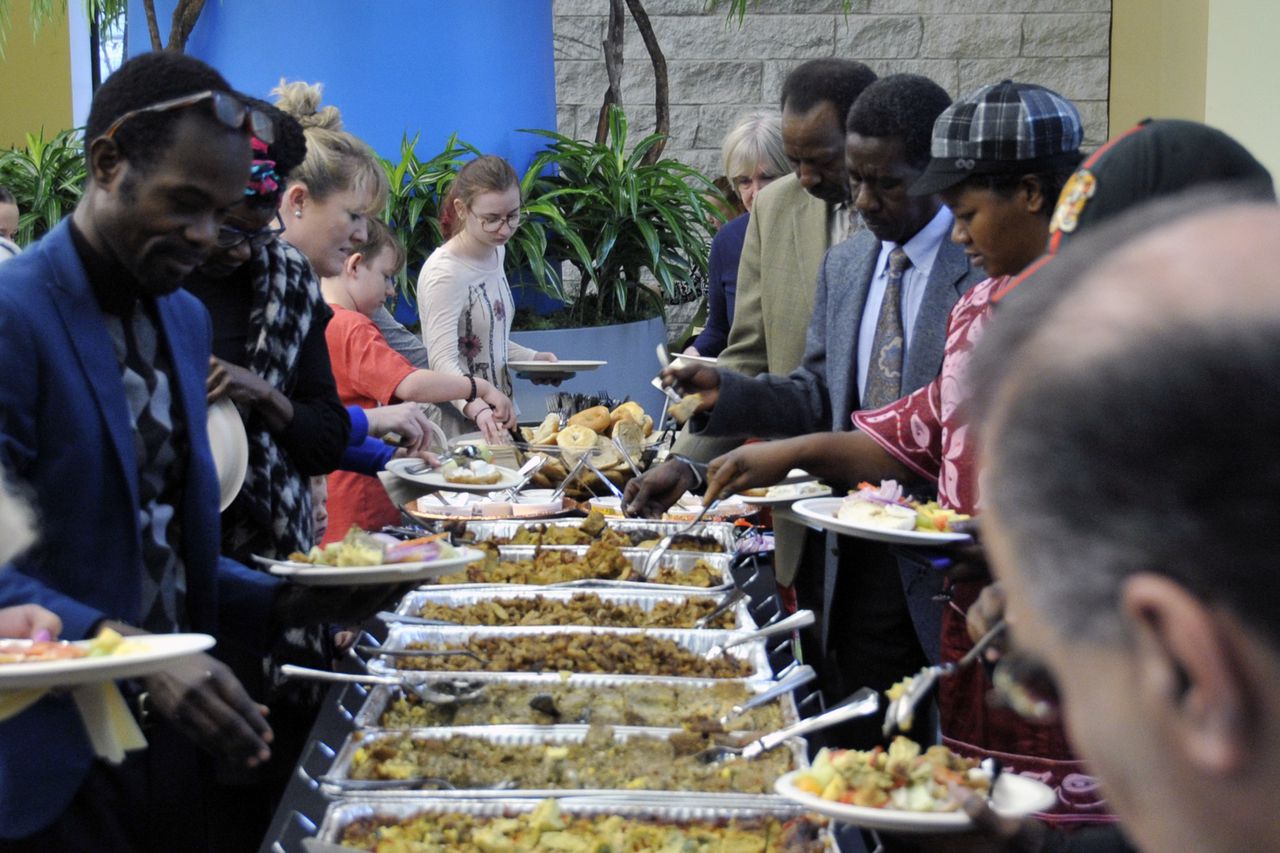
Attendees pictured at the 2019 Sister Cities Conference, which had seven countries bring representatives in person and five attend via video conference. The 2020 conference will be virtual on platform called Hopin. (Global Cleveland)
The conference’s first day will welcome attendees with speakers, including Cleveland Public Library Director Felton Thomas and City Council President Kevin Kelley.
The next three days will have different themes. On Sept. 30, the focus will be on municipal and civic leadership.
A highlight will be a mayoral panel, where mayors from Slovenia, Israel, Nigeria, Italy, Lithuania and France will talk with one another and share successes.
Another important panel that day will be focused on COVID-19. Doctors from Italy, Taiwan and the Democratic Republic of the Congo will be on the panel, along with Dr. Steve Gordon of Cleveland Clinic. Brian Kimball, the interim director of the City of Cleveland Department of Public Health, will moderate.
Last year delegates from Bahir-Dar, Ethiopia, received some practical medical knowledge. Bahir-Dar was one of seven cities that came in person, and the city was having some issues with its medical transport system, said Global Cleveland program manager Elizabeth Cusma. The Bahir-Dar delegates learned from Cleveland EMS and took the new knowledge back home.
“That’s the tangible benefits of a sister city that maybe you can’t monetize specifically, but that really makes a difference,” Cusma said.
Education will be the theme Oct. 1, and institutions will discuss global studies and partner programs on a university panel. Cusma said an eventual goal is to have an international library card so if someone has a CPL library card, it can be used in different sister libraries.
The final day will focus on business and economic development, with “At the Heart of the City.” Downtown Cleveland Alliance President Joe Marinucci and Janja Romih Kulenovic, the head of sales promotion department in Ljubljana, Slovenia, will discuss why a city’s downtown is important for its overall stability and well-being.
Cusma said the long-term goal is to make the Sister Cities Conference “the most international week in Cleveland.”
“It is a no cost event because we really do want students and CEOs to come,” Cusma said. “That’s the only way for great ideas to be born is putting a lot of different people in one place together with a common purpose. And sister cities’ purpose really is that tri-pillar of education, civic and municipal issues and business, and we need all three for our best ideas to come to fruition.”



